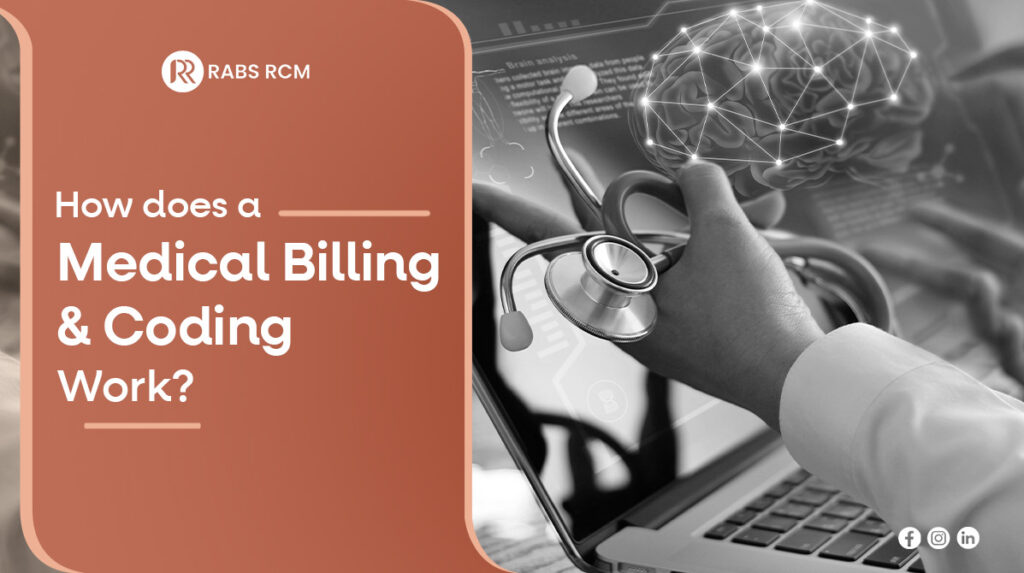
How does a Medical Billing and Coding Company Work?
In the complex landscape of healthcare administration, one crucial aspect that ensures the financial health of medical practices and healthcare facilities is medical billing and coding. Medical billing and coding are pivotal in ensuring financial stability and operation efficiency. This includes the conversion of medical diagnoses, treatments, procedures, and services into universally accepted alphanumeric codes used for billing and insurance purposes.
In this blog, we will explore the significance of medical billing and coding and how it streamlines tasks, alleviates the burden of healthcare providers and seamlessly fits into the intricate tapestry of healthcare administration.
The Role of Medical Coding
Medical coding is a universal language that helps healthcare providers, and insurance companies understand complex medical procedures and diagnoses by converting them into standardised codes. These codes consist of alphanumerics and follow a standardised system, with the most commonly used being the International Classification of Diseases (ICD) for diagnoses and Current Procedural Terminology (CPT) to document every detail of a patient’s healthcare journey.
Medical coders play the crucial role of detail detective in the healthcare system. They meticulously examine patient records, decipher doctors’ notes and analyse test results, among other medical documents. With exceptional precision, they pick the appropriate codes to describe the patient’s illness, the treatments, and the resources utilised.
The Importance of Precise Coding
Accurate coding holds the utmost importance in medical billing. These codes significantly impact various aspects of patient care financial reimbursements. For instance, insurance claims heavily depend on these codes to determine coverage and reimbursement rates. Even a minor error in coding can result in claim denials or payment delays, both of which can affect the healthcare provider’s revenue stream and the patient’s experience.
The Role of Medical Billing
After the completion of medical coding, the next step is medical billing. It’s converting these coded patient records into comprehensible bills understandable to patients and insurance companies. Medical billers have a distinct skill set that allows them to bridge the gap between healthcare providers, patients, and payers.
Billers painstakingly prepare claims by gathering coded information, patient data, insurance information, and treatment dates. They communicate with insurance companies and make claims for payment. Furthermore, medical billers are skilled in deciphering complicated insurance policies to verify that claims are presented per the payer’s criteria.
The Interplay and Impact
The link between medical coding and billing is clear. When coding is correct, it lays the basis for efficient billing. Claims can be sent fast and without errors because of precise coding. On the other hand, coding errors might lead to billing complications, which can lead to payment delays and paperwork complexity.
As the healthcare sector evolves, the tasks of medical coders and billers remain consistent, allowing healthcare practitioners to focus on their core objective – providing excellent treatment – while the financial element is methodically cared for behind the scenes.
Benefits of Outsourcing Medical Billing and Coding Services
Efficiency and accuracy are non-negotiable in the complex realm of healthcare administration. Outsourcing medical billing and coding services is a strategic decision that more healthcare companies are embracing. This wise decision is about more than just delegating responsibilities; it is also about simplifying processes, optimising revenue cycles, and improving patient care. Let’s go into the world of outsourcing these vital services and see what benefits it may provide.
Unparalleled Expertise
Outsourcing medical billing and coding introduces a new level of expertise. These individuals are well-versed in the subtleties of medical codes, payer regulations, and compliance requirements. Their specialised knowledge ensures that claims are precisely recorded, filed on time, and passed through the insurance companies’ convoluted channels with few hiccups. As a result, claim denials have decreased, and income flow has improved.
Emphasise Core Strengths
Consider a world where healthcare practitioners may focus entirely on patient care without being distracted by the operational complexity of billing and coding. Outsourcing frees clinicians from administrative responsibilities, allowing them to focus on their main competencies: providing high-quality medical services and fostering patient relationships.
Accelerates Revenue Process
The saying “time is money” could not be more accurate in the healthcare industry. Outsourcing medical billing and coding can dramatically shorten revenue cycles. Payments are handled more quickly when specialists manage claim filing and follow-up complexities, resulting in a healthier bottom line. Improved financial flow and the capacity to invest in modern medical technology and patient care initiatives result from faster payments.
Smooth Scalability
Healthcare is a dynamic industry, with patient volumes shifting erratically. Outsourcing allows you to scale up or down in response to demand. Outsourced partners quickly change their resources to meet the ebb and flow of patients, assuring constant, correct billing and coding regardless of need.
Access to Cutting-edge Technology
Partners in outsourcing invest in cutting-edge medical billing and coding software to ensure accuracy, efficiency, and compliance. This relieves healthcare providers of the stress of purchasing and maintaining expensive software. Access to such technology simplifies operations and reporting, allowing for more informed decision-making and revenue management.
Alleviate Risk
Navigating the maze of healthcare rules, particularly the severe HIPAA requirements, necessitates close attention. Outsourcing partners are compliance experts, lowering the chance of expensive infractions and legal entanglements. This risk reduction extends to data security, ensuring patient information is kept secure.
Cost Effective
Outsourcing medical billing and coding can be more cost-effective in the long run than performing these tasks in-house. The costs of personnel pay, benefits, training, software, and infrastructure might be significant. Outsourcing offers a transparent, predictable pricing structure proportional to the value supplied.
Medical billing and coding are critical in healthcare, ensuring accuracy and financial feasibility. Outsourcing these services provides faster claims processing, fewer denials, and more consistent income flow. Scalability, access to cutting-edge technology, compliance, and cost-efficiency are also offered, allowing physicians to focus on patient care and enhance patient outcomes.

